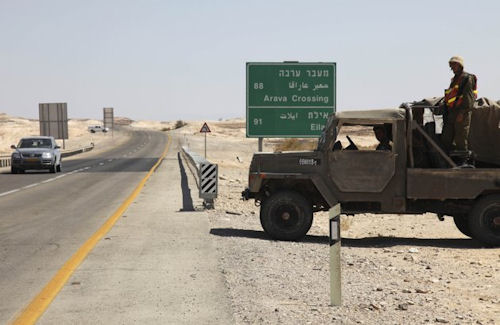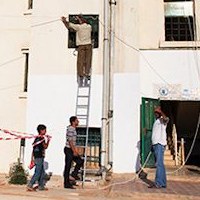![]()
Thu, Aug 18, 2011 | Rubin Reports | By Barry Rubin

An Israeli soldier stands on a vehicle, part of a road block formed by security forces on roads leading to the sites of several attacks in the Arava desert, southern Israel, Thursday, Aug. 18, 2011. Terrorists armed with heavy weapons, guns and explosive devices carried out a string of three terror attacks in southern Israel near the Egyptian border on Thursday, killing and wounding an unknown number of civilians and IDF soldiers, officials said. (AP Photo/Yehuda Lachiani)
New Phase in War as Terrorists Cross Egypt-Israel Border
This isn’t just another terrorist attack — it’s a major escalation, a new phase in the Arab-Israeli conflict in two ways.
First, it is the bitter fruit of the U.S.-backed downfall of the government of President Husni Mubarak in Egypt, opening the Egypt-Israel border as a new front in the war.
Second, it is probably the first successful al-Qaida attack on Israel. (The Palestinian Popular Committees, a Gaza-based al-Qaida affiliate is the prime suspect.)
A group of up to 20 terrorists from the Gaza Strip travelled through Egypt using vehicles, then went through the Egyptian border area without any apparent difficulty. Approaching the Egypt-Israel border they fired at a regularly scheduled public bus and cars on highway 12 — a road between Beersheva and Eilat — then entered Israeli territory. Their armaments included mortars, and an RPG as well as handguns. Soldiers engaged the terrorists in a firefight killing three. Several soldiers were wounded; seven terrorists were killed.
According to several eyewitnesses, the attackers were wearing Egyptian army uniforms, a detail which if true is going to be a major issue. Stolen or sold or provided by low-level sympathizers in the Egyptian army? And the site of the attack was near an Egyptian army outpost which — so far as we know now — didn’t do anything about it. One eyewitness said a terrorist was firing from an Egyptian army position. Again, these details will have to be checked by an investigation.
An explosive device, like the ones used in Iraq, was laid to ambush arriving Israeli troops. This is a very sophisticated and complex operation. Seven Israelis were killed: four people in one family whose car was attacked — including two children, aged four and six — and three soldiers riding on a public bus. At least 30 were wounded. For more than 30 years the Egyptian government ensured peace along the desolate border between the two countries. In the post-Mubarak phase — as I warned back in February — the successor regime is not so committed to the Egypt-Israel peace.
What I pointed out then still applies:
“There are many steps the Egyptian government could take [regarding Israel]: letting weapons flow and terrorists walk across the Egypt-Gaza border; not trying too hard to stop terrorists from crossing the Egypt-Israel border; not providing proper protection to Israeli citizens travelling in Egypt or to the Israeli embassy; recalling Egyptian diplomats from Israel; stepping up hostile and official anti-Israel incitement; and so on…”
–“Another problem is border security. Again, we are told that it is in the interest of Egypt, especially the army, to avoid having terrorists cross the border into Israel. Yet similar logic has often proven mistaken in previous, similar cases. With junior officers and soldiers sympathizing with Islamism or radical nationalism, the orders of the generals back in Cairo might not be followed with a high degree of discipline. There are already reports of al-Qaida planning to infiltrate into the Sinai to launch cross-border attacks.”
Military discipline has slackened and terrorist groups are increasingly operating in the Sinai penninsula. The natural gas pipeline to Israel is bombed every time it is put back into operation. A current Egyptian operation is intended to clear out terrorists affiliated with al-Qaida, from north Sinai.
The initial phase was marked by virtually free smuggling of arms, weapons, and money into the Gaza Strip for the Hamas regime there. The Mubarak government, though its efforts were imperfect, had kept the flow of munitions limited, making it harder for Hamas to renew full-scale warfare against Israel. Now, a new conflict could break out any time as Hamas is better-armed and more confident. The old Egyptian government looked at Hamas as a threat; the forthcoming Egyptian government will look at Hamas as an ally.
But while the media will no doubt attribute this attack to al-Qaida groups — and that might be accurate — this is far from the only problem. Hamas would no doubt cooperate with cross-border attacks on Israel from Egypt, as would the powerful Muslim Brotherhood which might well provide 30 to 40 percent of the members in the next parliament.
One should also remember the old strategy of the PLO in the late 1960s and in the 1970s: create waves of attacks on Israel’s borders, provoking Israeli retaliation and mass enthusiasm for war with Israel; then push Arab states into the war for what is hoped to be a full-scale showdown.
Have no doubt. This is not just an isolated incident but the opening of a new phase. It will get worse. At a minimum, Israel will have to devote a lot more of its limited resources to guarding the Egypt-Israel border. An important question is how decisively will the Egyptian military react and how supportive of the attack will be Egyptian public opinion.
Given U.S. policy, nothing can be expected from Washington except words of dismay. The Egyptian regime will assure everyone that it is committed to the peace treaty and will take strong action. But what will happen when the military hands over power to a parliament with an Islamist-far left majority in a few months? Anyone want to hand over Israel’s West Bank border to sovereign Palestinian control?
Speaking of which, both Hamas and Fatah sites feature rejoicing at the killing of Israelis. Nobody is critical of the attacks. One Fatah site has such remarks as: “”Our Lord is with the heroes”; [I] call for resistance in the Gaza with rocket fire and suicide bombings and the Glory of God and His Messenger”; “Tribute to the Heroes of each attack and no matter what their affiliation”; “God is great and victory is coming”
This attack may indeed be only the opening round. Massive Palestinian demonstrations are planned for September either to demand, celebrate, or mourn the UN’s response to a unilateral declaration of independence. The Palestinian Authority leadership says it wants the marches to be peaceful. But in this atmosphere that’s hard to imagine.
Meanwhile, despite assurances from the interim Egyptian government, once a radical majority directed foreign policy after the coming elections — combining leftists, extreme nationalists, and Islamists who are all anti-American and militant toward Israel — Hamas will gain confidence that Egypt is behind the armed struggle.
The better-case scenario is that Egypt restricts itself to letting arms, money, and volunteers cross into Gaza. The medium-case scenario is if Egypt’s government doesn’t do a very good job of stopping cross-border attacks and other provocations by the Muslim Brotherhood and Salafist groups in Egypt. The worst-case scenario is if Egypt actively joins Hamas.
If you read in the mass media that Hamas or the Muslim Brotherhood are good guys fighting against the “Salafist” terrorists from al-Qaida, I give you permission to snort derisively and cancel your subscriptions.
Oh, and here’s my favorite media coverage example from the Daily Beast, part of Newsweek:
“Israel has stuck back after a series of attacks that left at least seven dead and 25 injured. Do you support Israel’s right to retaliate — or does that simply lead to more instability in the region?”
What do you say? Right, terrorists have the right to attack Israel and murder people but Israel has no right to retaliate because that causes more instability? Well, yes, I’m sure a lot of “highly educated” people think that way.
The only defenses to the increasingly worse scenarios are: the Egyptian military’s hope to continue receiving U.S. aid; the army’s fear that it would lose a war; a demagogic but pragmatic president in the person of Arm Mousa; and centrist forces that want to pursue economic development and higher living standards rather than foreign adventures. Israel will now have to spend hundreds of millions of dollars — that otherwise could have gone for new housing — to build a border fence along a border of roughly 125 miles (the current fence is only 20 percent completed).
There is something to that combination of factors but it is not quite enough to make one feel things will remain calm. For example, the two best-known “reformist” leaders — Ayman Nour and Muhammad ElBaradei, who are both running for president — have called for revising the treaty in Egypt’s favor. Some officers have radical nationalist and Islamist sympathies. And pragmatism is often trumped by demagoguery and foreign adventures in the Arabic-speaking world. Indeed, with Egypt headed for a major economic crisis within the next two years, such trends seem almost inevitable.
Here is some background material on events in Egypt and Sinai:
— Terrorism Returns to Egypt, Will Sanity about Islamism Arrive in the West?.
— A Weapons-Laden Ship for Gaza Marks A Big Transformation of the Middle East.
— Egypt’s Revolution: The More They Reassure Us, The More We Worry.
— NATO Allies, Egyptian “Democracy” Become Main Weapons’ Suppliers for Hamas.



 RSS
RSS










New Phase in War as Terrorists Cross Egypt-Israel Border | #Egypt #Israel #Terror #Eilat #IDF http://t.co/BbvCKZX
New Phase in War as Terrorists Cross Egypt-Israel Border | #Egypt #Israel #Terror #Eilat #IDF http://t.co/BbvCKZX